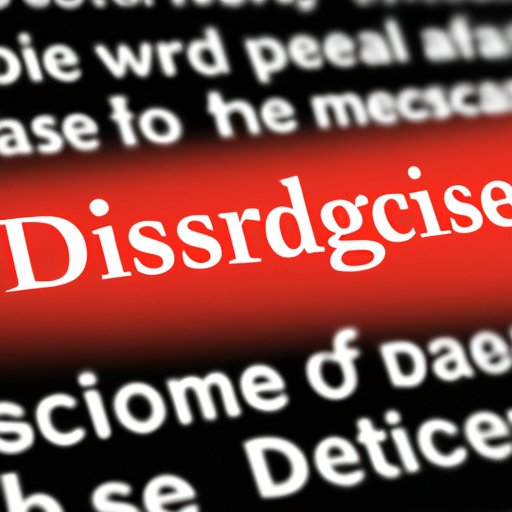
Introduction
Understanding the definition of disease is an important facet of public health and wellbeing. By having a clear understanding of what disease means, we can identify, treat, and prevent illnesses. This article aims to explore the many different definitions of disease, its impact on society, and the implications for healthcare.
Understanding the Basics: What Is the Definition of Disease?
Disease can be defined as a deviation from normal structure or function that adversely affects the body’s ability to maintain homeostasis. It is characterized by a set of symptoms, signs, or laboratory findings that indicate the presence of an abnormality in the body. Throughout history, the definition of disease has evolved from a supernatural and spiritual concept to a more scientific and biologically-based one. A clear and consistent definition is essential for effective communication, accurate diagnosis, and appropriate treatment of illnesses.
The Impact of Disease: Defining the Medical Phenomenon We All Fear
Disease has a profound impact on individuals, communities, and entire societies. It affects healthcare systems, economies, and social structures. The psychological and emotional impact of disease can also be significant, with feelings of fear, anxiety, and isolation. The global COVID-19 pandemic is a poignant example of how a single disease can affect the world’s population in a short amount of time and cause widespread hardship and suffering.
Exploring the Varieties of Disease: A Comprehensive Look at Its Many Definitions
Diseases are classified and defined in many different ways, depending on the school of thought or context in which they are being used. Medical systems generally categorize diseases based on their etiology, pathogenesis, and clinical manifestations. Social and cultural factors may also play a role in the way diseases are defined and perceived. For example, the definition of obesity varies widely across cultures and can be influenced by socioeconomic status and cultural norms.
Why Defining Disease Matters: A Guide to Understanding the Science and Medicine Behind Illness
Having clear and consistent definitions of diseases is crucial in science and medicine. Disease definitions affect how researchers conduct studies, how clinicians diagnose and treat patients, and how public health policies are developed and implemented. A lack of clarity or consensus on disease definition can lead to confusion, miscommunication, and misguided interventions. The development and standardization of disease classification systems like the International Classification of Diseases (ICD) has greatly improved disease diagnosis and treatment worldwide.
Demystifying Disease: A Closer Look at the Definition and Its Implications for Healthcare
Disease definition impacts everyday healthcare practices and decision-making. Clinicians must be able to diagnose and classify diseases accurately to provide appropriate treatment and care. The ongoing evolution of disease definitions and classification systems poses a challenge for healthcare professionals, in keeping abreast of the latest developments and adapting to changes. In some cases, there may be controversy surrounding the definition of a particular disease, such as chronic Lyme disease, where the medical community is divided on the validity of the diagnosis. Strategies for ensuring disease definitions remain relevant and accurate include ongoing research, multidisciplinary collaboration, and community engagement.
Conclusion
Defining what is meant by disease is a multifaceted and ever-evolving issue, with implications for the science, medicine, and wellbeing of our society. By gaining a greater understanding of disease and its many definitions, we can ensure accurate diagnosis and treatment, promote effective public health interventions, and foster a culture of collaboration and understanding within our healthcare systems. We invite readers to reflect on their own understanding of the definition of disease and its impact on society and public health.





